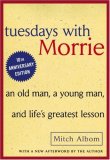Summary | Excerpt | Reading Guide | Reviews | Readalikes | Genres & Themes | Author Bio

An Old Man, A Young Man & The Last Great Lesson
by Mitch Albom
In the fall of 1994, Morrie came to the hilly Brandeis campus to teach his final college course. He could have skipped this, of course. The university would have understood. Why suffer in front of so many people? Stay at home. Get your affairs in order. But the idea of quitting did not occur to Morrie.
Instead, he hobbled into the classroom, his home for more than thirty years. Because of the cane, he took a while to reach the chair. Finally, he sat down, dropped his glasses off his nose, and looked out at the young faces who stared back in silence.
"My friends, I assume you are all here for the Social Psychology class. I have been teaching this course for twenty years, and this is the first time I can say there is a risk in taking it, because I have a fatal illness. I may not live to finish the semester.
"If you feel this is a problem, I understand if you wish to drop the course."
He smiled.
And that was the end of his secret.
ALS is like a lit candle: it melts your nerves and leaves your body a pile of wax. Often. it begins with the legs and works its way up. You lose control of your thigh muscles, so that you cannot support yourself standing. You lose control of your trunk muscles, so that you cannot sit up straight. By the end, if you are still alive, you are breathing through a tube in a hole in your throat, while your soul, perfectly awake, is imprisoned inside a limp husk, perhaps able to blink, or cluck a tongue, like something from a science fiction movie, the man frozen inside his own flesh. This takes no more than five years from the day you contract the disease.
Morrie's doctors guessed he had two years left.
Morrie knew it was less.
But my old professor had made a profound decision, one he began to construct the day he came out of the doctor's office with a sword hanging over his head. Do I wither up and disappear, or do I make the best of my time left? he had asked himself.
He would not wither. He would not be ashamed of dying.
Instead, he would make death his final project, the center point of his days. Since everyone was going to die, he could be of great value, right? He could be research. A human textbook. Study me in my slow and patient demise. Watch what happens to me. Learn with me.
Morrie would walk that final bridge between life and death, and narrate the trip.
The fall semester passed quickly. The pills increased. Therapy became a regular routine. Nurses came to his house to work with Morrie's withering legs, to keep the muscles active, bending them back and forth as if pumping water from a well. Massage specialists came by once a week to try to soothe the constant, heavy stiffness he felt. He met with meditation teachers, and closed his eyes and narrowed his thoughts until his world shrunk down to a single breath, in and out, in and out.
One day, using his cane, he stepped onto the curb and fell over into the street. The cane was exchanged for a walker. As his body weakened, the back and forth to the bathroom became too exhausting, so Morrie began to urinate into a large beaker. He had to support himself as he did this, meaning someone had to hold the beaker while Morrie filled it.
Most of us would be embarrassed by all this, especially at Morrie's age. But Morrie was not like most of us. When some of his close colleagues would visit, he would say to them, "Listen, I have to pee. Would you mind helping? Are you okay with that?"
Often, to their own surprise, they were.
In fact, he entertained a growing stream of visitors. He had discussion groups about dying, what it really meant, how societies had always been afraid of it without necessarily understanding it. He told his friends that if they really wanted to help him, they would treat him not with sympathy but with visits, phone calls, a sharing of their problems--the way they had always shared their problems, because Morrie had always been a wonderful listener.
Excerpted from Tuesdays With Morrie : An Old Man, a Young Man, and the Last Great Lesson by Mitch Albom. Copyright © 1997 by Mitch Albom. Excerpted by permission of Doubleday, a division of the Bantam Doubleday Dell Publishing Group, Inc. All rights reserved. No part of this excerpt may be reproduced or reprinted without permission in writing from the publisher.
Your guide toexceptional books
BookBrowse seeks out and recommends the best in contemporary fiction and nonfiction—books that not only engage and entertain but also deepen our understanding of ourselves and the world around us.